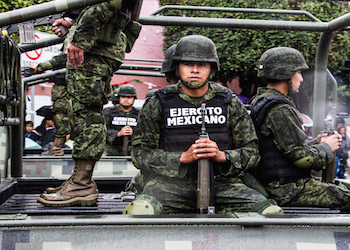Mexico’s Defense Secretary says the army will send 500 soldiers to Ciudad Mier in the embattled state of Tamaulipas along the US-Mexico border, indicating that the Mexican government will continue to use the military as a stopgap in the fight against crime.
According to Infodefensa, at least 500 soldiers from the Mexican Army’s 25th Cavalry, originally deployed in the 17th Military Zone in Querétaro, will be sent to reinforce security. This will be the first time in four years that Ciudad Mier has had a military presence.
Milenio reported that the decision was designed to strengthen the federal, state and municipal governments’ efforts to combat organized crime and restore security in the region, an area that is seeing fierce fighting between several competing criminal organizations.
The decision comes just days after the inauguration of US President Donald Trump, who has signaled that he will beef up security — and possibly a large wall — along the US-Mexico border.
Ciudad Mier is part of what is known as the Frontera Chica. It is critical for illegal trafficking to the United States and is home to the Burgos Basin, Mexico’s primary natural gas field.
Since the Mexican government initiated a more frontal assualt on drug trafficking groups in December 2006, Tamaulipas has become one of the nation’s most violent as the Zetas, the Sinaloa Cartel, the Gulf Cartel and the Familia Michoacana battle for control of these trafficking routes.
InSight Crime Analysis
The decision indicates that the military remains a go-to option for the administration of Mexican President Enrique Peña Nieto, despite the fact that militarized efforts nationwide to combat organized crime have shown considerable shortcomings. While they can have positive impacts on improving local security in the short term, criminal activities are often displaced to other areas or return once the military vacates.
SEE ALSO: Mexico News and Profiles
Under Trump, the United States may also beef up the border. The United States Congress allocated $750 million to the Northern Triangle region for “development assistance, economic programs, military financing and training, and global health and security programs.”
Some of these funds will most likely be allocated to border security efforts. They will also be part of a broader effort to work with Mexico and stem the northern flow of Central American migrants from the region.

